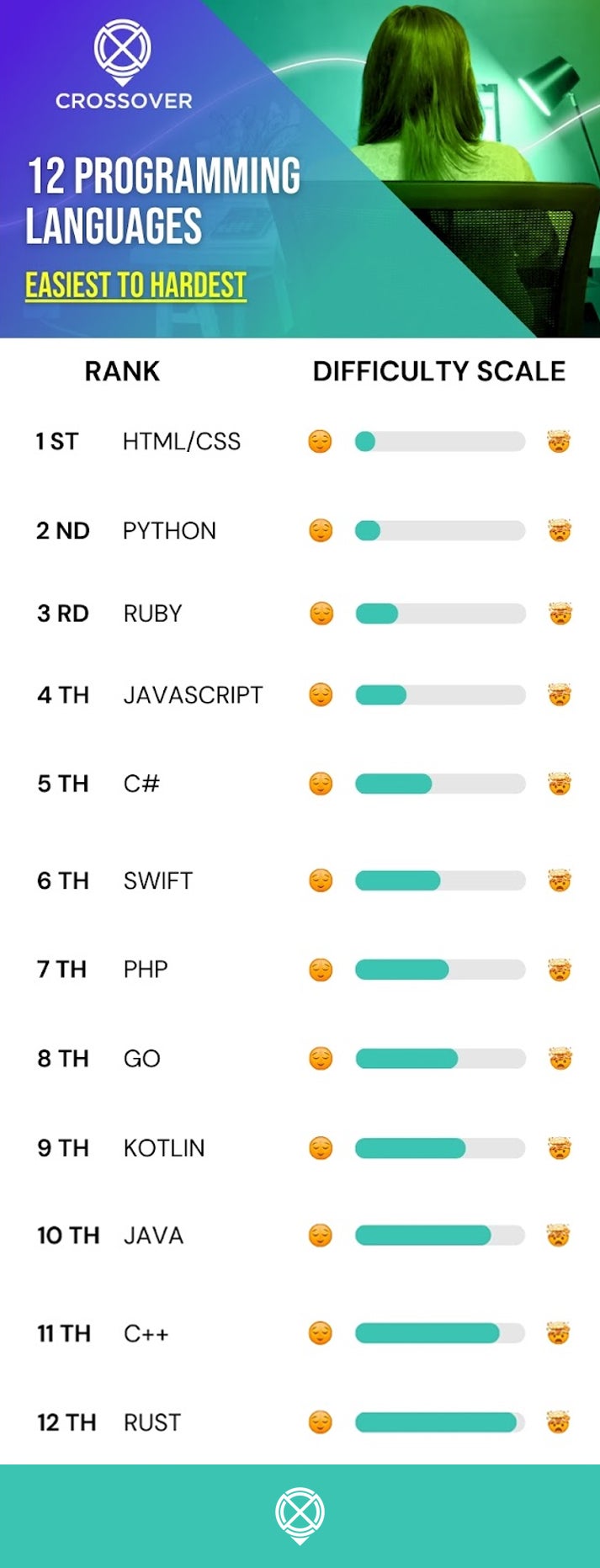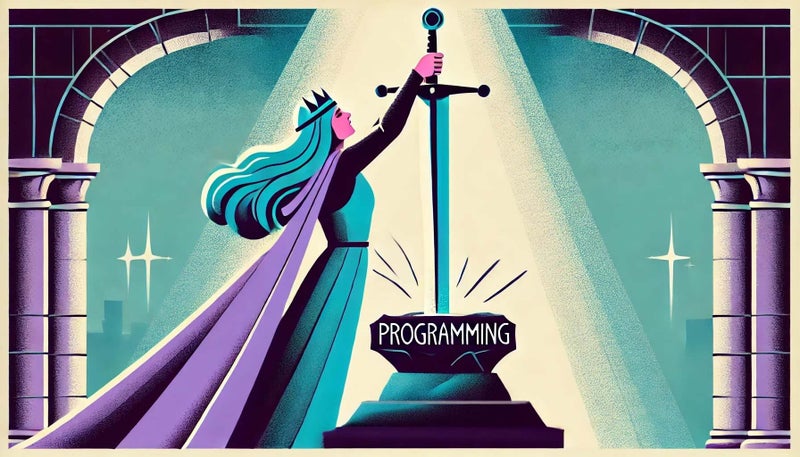Contents
- Beginner-Friendly Languages
- Intermediate Languages
- Expert-Level Languages
- Time To Get Coding
Coding isn’t only for geniuses with IQs in the stratosphere. We're about to blow the lid off 12 programming languages, ranking them from "piece of cake" to "peace be with you." Whether you're a coding rookie or a weathered veteran, this guide will help you navigate the wild world of programming languages to find your perfect match.
Let's get one thing straight - programming isn't an exclusive club for people who can recite pi to the 100th digit.
It's all about picking the right language for what you need and getting your hours in. And with AI as the Excalibur to your Arthur, the barriers of entry have never been lower.
Software developer jobs are growing 8X faster than the average occupation growth rate. And 60% of engineering managers and executives see a shortage of qualified software engineering candidates on the horizon.
Whether you're looking to switch careers or level up your skills, now's the time to jump on the coding bandwagon.
But where to begin?
That's where we come in. Here’s our list of 12 programming languages… ranked by difficulty.

Beginner-Friendly Languages
Your Coding Language Launchpad
1. HTML/CSS (Difficulty: 10/100)
Perfect for: Web design newbies who dream of crafting stunning, responsive websites from scratch.
HTML and CSS are the dynamic duo of web development. They're not just easy to learn - they're the bread and butter of the entire web. HTML forms the skeleton of your website, giving it structure, while CSS is the fashionista that makes everything look fabulous.
Sure, some coding purists might argue that HTML and CSS aren't "real" programming languages.
But let's be "real real" - they're the gateway to the coding world, and are essential for any aspiring web developer.
They're easy to sink your teeth into and will have you feeling like a coding whizz in no time.
We have no intention of gatekeeping your first step with purist semantics!
Standout features:
- Instant gratification with immediate visual results
- The cornerstone of all web development (seriously, you can't escape these two)
- Responsive design capabilities that'll make your sites look good on everything from a smartwatch to a jumbotron
2. Python (Difficulty: 20/100)
Perfect for: Coding newcomers who want to dabble in data science, AI, automation, and building powerful web backends without breaking a sweat (or their keyboard).
Python is versatile, readable, and perfect for beginners wanting to maximize bang for their buck. It’s hard to find a language as approachable and as ready for anything as Python.
Built by Guido van Rossum and raised by a global community of passionate developers, Python has grown from a hobby project to a powerhouse in the coding world.
It's got its hands on everything from web development to machine learning, and it's not stopping anytime soon.
Don't let Python's beginner position fool you. This language packs a serious punch when it comes to functionality.
Standout features
- Readable, English-like syntax
- An extensive library of tools and frameworks with community support to match
- Versatile applications from web development to machine learning (it's the undisputed jack-of-all-trades of the coding world)
3. Ruby (Difficulty: 30/100)
Perfect for: Web dev enthusiasts who value elegant code and rapid development.
Ruby is the Zen master at the top of the mountain. It follows the principle of least surprise, being built from the ground up to minimize confusion and keep you in flow. It's a joy!
Created by Yukihiro Matsumoto in 1995, Ruby was designed with developer happiness in mind. It's like Matz took the Marie Kondo approach to Ruby - if it didn’t spark joy, it probably wasn’t included.
While Ruby might not be the new kid on the block anymore, it's still a favorite in the web development world. There's a reason it's the language of choice for companies like Airbnb, GitHub, and Shopify.
Sometimes, the oldies are still the goodies.
Standout features
- Expressive, readable, and approachable syntax
- "Everything is an object" philosophy cuts a sometimes confusing layer of complexity
- Faster development through the Ruby on Rails framework
4. JavaScript (Difficulty: 40/100)
Perfect for: Future full-stack developers ready to bring web pages to life and power modern web apps.
JavaScript is the caffeinated squirrel of programming languages - it's everywhere, it's fast, and it can do some pretty nutty things.
It's the language that makes the web come alive, turning static pages into dynamic, interactive experiences.
Coming to life in the browser wars of the mid-90s, JavaScript has come a long way from its humble beginnings.
It's no longer just for adding pesky pop-ups to websites (although it can still do that if you're feeling nostalgic).
While JavaScript's flexibility is its strength, it can also be its weakness. It's got almost endless frameworks and libraries, which can be overwhelming for beginners.
But don't let that scare you off!
Mastering JavaScript is a superpower in the web development world. It's not the most frequently used language leveraged by developers for nothing.
Standout features:
- Runs natively in browsers (no installation required)
- Versatile for front-end and back-end development
- Vast ecosystem of tools and frameworks to supercharge your coding
Intermediate Languages
Level Up Your Coding Game
5. C# (Difficulty: 45/100)
Perfect for: Aspiring game developers and Windows app creators looking to harness Microsoft's ecosystem (and maybe build the next Escape from Tarkov).
C# (pronounced "C-sharp") is Microsoft's golden child.
It's powerful, flexible, and perfect for Windows apps and game development. If you're aiming for enterprise-level applications or dreaming of creating the next big indie game, C# is your ticket to the big leagues.
C# brings a fair amount of versatility to the table. It's primarily used across the Microsoft ecosystem, but, thanks to Unity, it's picked up massive steam in game dev.
While C# might have a steeper learning curve than some of the languages we've covered so far, it's still accessible for intermediate programmers.
Plus, with the backing of Microsoft and a massive community, you'll never be short of resources or support.
Standout features:
- Strong typing and automatic memory management
- Powerful for Windows and game development
- Robust system for managing data types
6. Swift (Difficulty: 50/100)
Perfect for: Mobile app dreamers ready to conquer the Apple ecosystem and build sleek iOS apps.
Swift is the cool kid on Apple's iOS development block. It's modern, safe, and ideal for creating apps that'll make iPhone users swoon. If you've got your sights set on the App Store, Swift is where it's at.
Introduced by Apple in 2014, Swift was designed to replace Objective-C, addressing many of its predecessor's shortcomings.
It's like Objective-C went to a coding gym, got a glow-up, and came back as the language equivalent of a Marvel superhero.
While Swift's learning curve can be quite steep, it's still surprisingly approachable for intermediate programmers.
Also, don't forget about Apple's world-famous support. Between them and Swift's growing community, you’ll blast past any obstacles in no time.
Standout features:
- Clean and expressive syntax
- Strong focus on safety features (nobody likes a crashy app)
- First-class support from Apple
7. PHP (Difficulty: 55/100)
Perfect for: Web developers looking to power dynamic websites and tackle content management systems.
PHP might not be a spring chicken, but it's that reliable old car that keeps on chugging. It's the language that brought us Facebook, and WordPress, and still powers a significant portion of the web.
Born in the mid-90s as a set of Common Gateway Interface (CGI) binaries written in C, PHP has grown into a full-fledged programming language. It might not be the prettiest tool in the shed, but it definitely gets the job done.
While PHP has its quirks and detractors, its ease of use and vast ecosystem make it a solid choice for web development.
It's particularly strong when it comes to database integration, making it a go-to language for building dynamic, data-driven websites.
Standout features:
- Easy database integration
- More tools than your local hardware store
- Powers popular CMS like WordPress
8. Go (Difficulty: 60/100)
Perfect for: Backend developers craving simplicity and blazing-fast performance.
Developed by Google in 2007, Go is one of the newer languages on this list. It was built by programming legends Robert Griesemer, Rob Pike, and Ken Thompson with the goal of keeping things tidy and efficient.
Go's minimalist approach might make you feel like you're coding with one hand tied behind your back at first, but that's kind of the point. It forces you to write clean, maintainable code that runs like the wind.
Go shines in building scalable web services, creating DevOps and cloud tools, and handling big data processing. While Go's library ecosystem isn't as vast as other popular languages, its simplicity is its strength.
It's not the language of choice for companies like Google, Uber, and Dropbox for nothing.
Standout features:
- Blazing-fast compilation and execution
- Built-in concurrency support
- Simplicity and efficiency in syntax
9. Kotlin (Difficulty: 65/100)
Perfect for: Android aficionados and Java developers seeking a modern twist on an old classic (and maybe a way to write less code).
Kotlin is like that mysterious cousin who shows up at family gatherings and makes everything more fun.
It's fully compatible with Java but packs a punch with modern features that'll make you wonder how you ever lived without them.
Built by JetBrains and adopted by Google for Android development, Kotlin is the new darling of the mobile world.
It takes the verbose Java syntax you know (and maybe love to hate) and trims it down to a lean, mean coding machine.
Kotlin is primarily used for Android app development (it's Google's preferred language now), server-side development, and multiplatform projects.
While Kotlin's learning curve might be a bit steeper than some languages, especially if you're coming from a non-Java background, its payoff is huge.
It'll make you more productive and your code more readable.
Standout features:
- Full Java interoperability
- Null safety to prevent common errors
- Concise syntax that reduces boilerplate code
Expert-Level Languages
For the Coding Connoisseurs
10. Java (Difficulty: 70/100)
Perfect for: Ambitious coders ready to build robust, scalable applications for enterprises and Android.
Java is an enterprise favorite, the steady workhorse of the programming world.
It's robust, platform-independent, and has a massive ecosystem. Java's "write once, run anywhere" philosophy makes it a powerhouse in cross-platform development.
Created by James Gosling at Sun Microsystems in 1995, Java has stood the test of time. From Android apps to enterprise software, we’re not kidding when we say Java's footprint covers the whole tech world.
Java's learning curve can be steep, especially for beginners.
Its wordiness and strict object-oriented programming paradigm can be challenging to grasp at first.
But once you master Java, you'll have a skill that's in high demand across the industry.
Standout features:
- Platform independence from its "write once, run anywhere" philosophy
- Robust and scalable for large applications (it's the language of choice for big projects)
- Extensive libraries and frameworks to supercharge your coding
11. C++ (Difficulty: 75/100)
Perfect for: Performance enthusiasts eager to create lightning-fast games and system-level software (and maybe optimize the heck out of every last bit of code).
C++ is the speed demon of programming languages, the go-to choice when performance is king.
It gives you unparalleled control over system resources and is the backbone of many high-performance applications and games.
Starting off as an extension of C, C++ added object-oriented programming features to its predecessor. From operating systems to game engines, C++ is behind some of the most performance-critical software out there.
C++ has a reputation for being one of the most difficult languages to learn. Its complex syntax and manual memory management can be a real headache.
But if you're looking to squeeze every last drop of performance out of your hardware, C++ is the tool for the job.
Standout features:
- Low-level system control
- The performance and efficiency of a cheetah on Redbull
- Object-oriented programming capabilities
12. Rust (Difficulty: 80/100)
Perfect for: Coding daredevils seeking the thrill of systems programming with a safety net.
Rust is fresh on the scene with a focus on safety and performance.
It's challenging to learn but rewards you with memory safety and the ability to handle multiple tasks efficiently without data races. Let’s call it the safety-conscious stunt driver of the group.
Created by Mozilla Research, Rust aims to provide the performance of C and C++ while guaranteeing memory safety.
That's why Rust is gaining traction in system programming, web assembly, and anywhere else where performance and safety are critical.
Rust has a steep learning curve, even for experienced programmers.
Its unique approach to memory management and ownership can be a real head-scratcher. But for those who master it, Rust offers a powerful tool for building fast, safe, and concurrent systems.
Standout features:
- Memory safety without garbage collection
- Concurrent programming without data races
- Modern syntax with powerful abstractions
Time To Get Coding
Don't let these difficulty rankings intimidate you.
From the gentle slopes of HTML/CSS to the challenging peaks of Rust, the world of programming languages is diverse and exciting.
Talking about the easiest or hardest programming language is fluid. Many languages share underlying principles, making it easier to pick up others after you’ve mastered one.
At the end of the day, the best language to learn is the one you'll stick with.
Choose a language that excites you and aligns with your goals and stick with it. There's no substitute for good old fashioned elbow grease.
Whether you're just starting your coding journey or looking to add another language to your toolkit, there's a programming language out there for you.
So find your Excalibur, hit the forums and get coding! Who knows? You might just be the next coding superstar the tech world is looking for.









